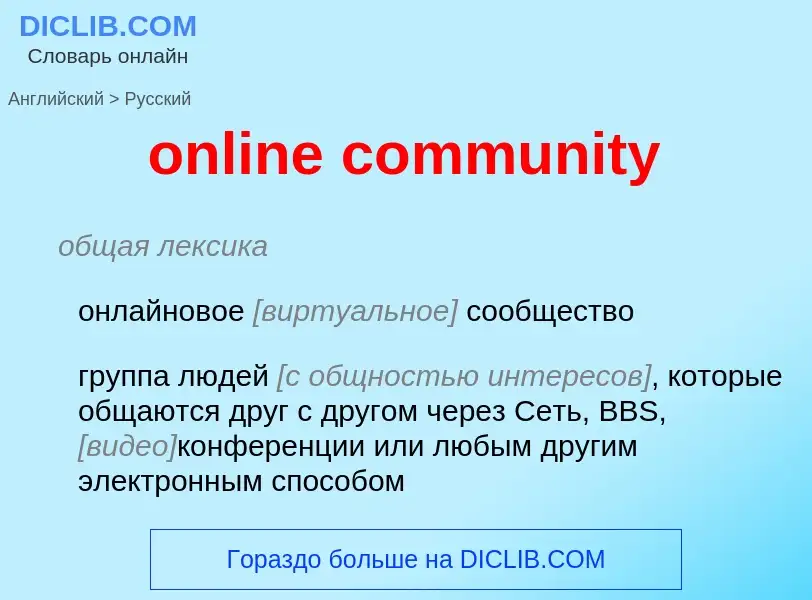Перевод и анализ слов искусственным интеллектом ChatGPT
На этой странице Вы можете получить подробный анализ слова или словосочетания, произведенный с помощью лучшей на сегодняшний день технологии искусственного интеллекта:
- как употребляется слово
- частота употребления
- используется оно чаще в устной или письменной речи
- варианты перевода слова
- примеры употребления (несколько фраз с переводом)
- этимология
online community - перевод на Английский
общая лексика
онлайновое [виртуальное] сообщество
группа людей [с общностью интересов], которые общаются друг с другом через Сеть, BBS, [видео]конференции или любым другим электронным способом
синоним
Смотрите также
[sini'kɔlədʒi]
общая лексика
синэкология
биоценология
экология сообществ
Смотрите также
существительное
биология
синэкология
биоценология
экология сообществ
[kə'mju:nɪtɪ,sentə]
общая лексика
районный общественный центр (здание для проведения культурно-просветительных и спортивных мероприятий в городе или сельской местности)
(районный или городской) культурно-спортивный центр
здание/помещение для проведения культурных и общественных мероприятий
строительное дело
дворец культуры, общественный клуб
помещение для проведения культурно-общественных мероприятий
строительное дело
культурно-зрелищный комплекс (центр)
['deisentə]
общая лексика
центр помощи инвалидам и престарелым
Определение
Википедия
A virtual community is a social network of individuals who connect through specific social media, potentially crossing geographical and political boundaries in order to pursue mutual interests or goals. Some of the most pervasive virtual communities are online communities operating under social networking services.
Howard Rheingold discussed virtual communities in his book, The Virtual Community, published in 1993. The book's discussion ranges from Rheingold's adventures on The WELL, computer-mediated communication, social groups and information science. Technologies cited include Usenet, MUDs (Multi-User Dungeon) and their derivatives MUSHes and MOOs, Internet Relay Chat (IRC), chat rooms and electronic mailing lists. Rheingold also points out the potential benefits for personal psychological well-being, as well as for society at large, of belonging to a virtual community. At the same time, it showed that job engagement positively influences virtual communities of practice engagement.
Virtual communities all encourage interaction, sometimes focusing around a particular interest or just to communicate. Some virtual communities do both. Community members are allowed to interact over a shared passion through various means: message boards, chat rooms, social networking World Wide Web sites, or virtual worlds. Members usually become attached to the community world, logging in and out on sites all day every day, which can certainly become an addiction.

![A party scene from ''[[Second Life]]'' set in [[Hyrule]] A party scene from ''[[Second Life]]'' set in [[Hyrule]]](https://commons.wikimedia.org/wiki/Special:FilePath/Party in Hyrule, Second Life, picture 2.png?width=200)
![An Internet forum powered by [[phpBB]] An Internet forum powered by [[phpBB]]](https://commons.wikimedia.org/wiki/Special:FilePath/Phpbb 3.0 prosilver.png?width=200)



![A bear with a salmon. Interspecific interactions such as [[predation]] are a key aspect of community ecology. A bear with a salmon. Interspecific interactions such as [[predation]] are a key aspect of community ecology.](https://commons.wikimedia.org/wiki/Special:FilePath/Bear predation on salmon can be high in many Alaskan rivers.jpg?width=200)



![Community centre in [[Marburg an der Lahn]], Germany. Community centre in [[Marburg an der Lahn]], Germany.](https://commons.wikimedia.org/wiki/Special:FilePath/Buergerhaus Ronhausen.jpg?width=200)
![Community centre in [[Klaukkala]], Finland. Community centre in [[Klaukkala]], Finland.](https://commons.wikimedia.org/wiki/Special:FilePath/Monitoimitalo Monikko.jpg?width=200)
